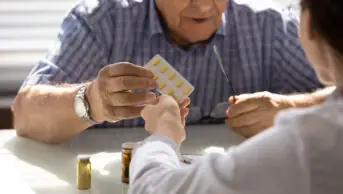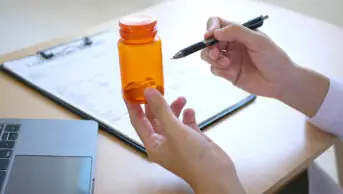
Shutterstock.com
Accessible patient-facing resources, including animations and invitations sent to patients’ phones, significantly improved patient engagement with structured medication reviews (SMRs), according to the findings of a Health Information Network (HIN) quality improvement project.
A report on the project, published on 20 June 2025, said that NHS funding was provided to 27 primary care networks (PCNs) in areas of high deprivation to target “seldom heard” patient cohorts, who were known to be at risk of polypharmacy and who were not engaging regularly with their GP practice.
In the report, HIN surveyed teams from those PCNs involved in the project, with 85% of respondents saying that the HIN patient-facing resources had helped them engage with the target communities — including those who do not speak English as a primary language, people who live in care homes or who are housebound and people with a learning disability or difficulty.
The resources were made available in a range of languages and in accessible and easy-read formats.
‘Stopping medicines safely’ leaflets were sent out to patients, as well as direct invitations to SMRs and a patient-facing animation about SMRs, which was screened in GP practices.
The report also revealed that half of the PCN respondents (50%) to the survey said that the materials helped patients to be better prepared for their SMR appointment, which led to patients being more likely to ask questions about their medicines.
In addition, 84% of PCN respondents agreed that participating in the project had improved their knowledge and understanding of SMRs, the report found.
Some respondents also reported that the project resulted in increased awareness of the value of the pharmacist’s role in the PCN.
The survey identified some areas that participants felt could still be improved in reaching patients and conducing SMRS.
These areas for improvement include more training for junior team members, to help them better understand problematic polypharmacy, and certain medicine risks and protected time so that teams could carry out SMRs as ‘business as usual’, the report said.
The HIN, working with academics from Leeds and Bradford universities, had previously designed and tested a number of SMR patient resources to help patients prepare for their SMR appointment.
From 2024, PCNs were also offered up to £1,500 to pilot the use of these resources.
PCN pharmacy teams began offering SMRs in 2020, and in 2022 financial incentives were introduced for carrying them out.
However, these financial incentives were later removed — and some pharmacists have reported being asked to deprioritise SMRs as a result.
Commenting on the report, Tony Avery, national clinical director for prescribing for NHS England, said: “I’m delighted that this targeted engagement in seldom-heard communities, piloted in 27 PCNs across the country, has resulted in such positive feedback and improved patient care for people from areas of higher deprivation.
“SMRs can play an important role to ensure the medicines that people are taking continue to deliver the benefit they should, and this report underscores how empowering people by providing accessible information can really help them get the most from their SMR.”
Graham Stretch, president of the Primary Care Pharmacy Association, said: “SMR is an evidenced-based intervention that improves outcomes and saves the health system money. It is vital [that] quality and safety incentives are maintained for primary care providers, of which SMR is a core component. The excellent HIN project demonstrates that for a modest investment, substantial returns can be realised.
“I would urge that continued support and incentivisation is maintained and offered to providers to ensure our patients continue to be assisted by their pharmacists and pharmacy technicians in using medicines in the safest and most efficacious way possible.”
Elen Jones, interim director of pharmacy at the Royal Pharmaceutical Society, said: “We recognise that ensuring equitable access to SMRs across all patient cohorts, particularly in disadvantaged communities, remains a significant challenge. It’s encouraging to see that 85% of participating PCNs in the study found the patient-facing resources helpful in engaging these communities.
“SMRs demonstrate the value of pharmacist-led interventions and their positive impact on patient outcomes. This highlights the need for continued investment in pharmacy services, including protected time for SMRs. Ongoing efforts are essential to tackle remaining challenges.”


